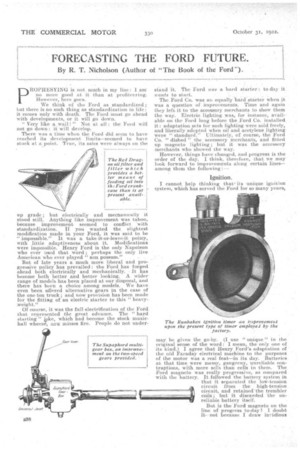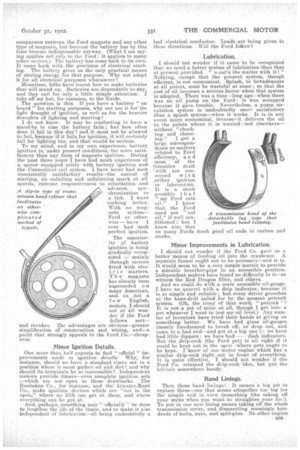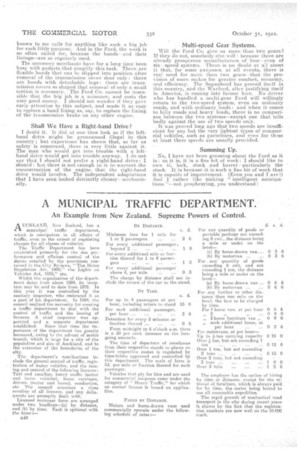FORECASTING THE FORD FUTURE.
Page 22

Page 23

Page 24

If you've noticed an error in this article please click here to report it so we can fix it.
By R. T. Nicholson (Author of "The Book of the Ford").
PROPHESYING is not much in my line : I am no more good at it than at profiteering. However, bore goes. We think of the Ford as standardized; but there is no such thing as standardization in life: it comes only with death. The Ford must go ahead with developments, or it will go 'down.
" Very like a, wail I " Not at all: the Ford will not go down:. it will develop.
There was a time when the Ford did seem to have reached its development limits—seemed to have stuck at a point. True, itssales were always on the „ up grade ; but electrically and mechanically it stood still. Anything like improvement was taboo, because improvement seemed to conflict with standardization. If you wanted the slightest modification made in your Ford, it was said to be " impossible." It was a take-it-or-leave-it policy, with little adaptiveness about it. Modifications were impossible. Henry Ford is the only Napoleon who ever used that word; perhaps the only live American who ever played "non possum." . • But of late years a much more liberal and progressive policy has prevailed; the Ford has forged ahead both electrically and mechanically. It has become both better And better looking. A wider range of models has been placed at our disposal, and there has been a choice among models. We have even been offered alternative gears in the case of the one-ton truck ; and now provision has been made for the fitting of an electric starter to this " heavy-weight."
Of course, it was the full electrification of the Ford that represented the great advance. The " hard starting " jcilte, which had hecoine the stock musichall wheez4, now misses fire. People do not under stand _it. The Ford was .a hard starter : to-day it wants to start. The Ford Co. was an •equally hard starter when it was a question of improvements. Time and again they left it to the accessory merchants to show them the way. Electric lighting was, for instance, available on the Ford long before the .Ford .Co. installed, it : adaptation sets for such lighting were sold freely; and liberally adopted when oil andacetylene lighting were " standard." Ultimately, of course, the Ford Co. " dished" the accessory merchants, and fitted up magneto lighting ; but it was the accessory merchants who showed the way.
However, things have changed, and progress is the order of the day. I think, therefore, that we may look forward to improvements along certain lines— among them the following :- Ignition.
I cannot help thinking that. its unique ignition system, which has served the Ford for so many years,
may be given the go-by. (I use " unique " in the original sense of the word: I mean, the only one of its kind.) I agree that Henry Ford's adaptation of the old Faraday electrical machine to the purposes of the motor was a real feat—in its day. Batteries at that time were messy, gangreny, unreliable contraptions, with more sells than cells in them. The Ford magneto was really progressive, as compared with the -battery. It followed the battery system in that it separated the low-tension circuit from the high-tension circuit, and retained thetrembler coils; but it discarded the unreliable battery itself.
But is the Ford magneto on the line of progress to-day ? I doubt it-not because I draw invidious
comparison between the Ford magneto and any other type of magneto, but because the battery has by this time become indispensable anyway. (What I am saying applies not only to the Ford : it applies to many other motors.) The battery has come back to its own. It came back with the provision of electrical starting. The battery gives us the only practical means of storing energy for that purpose. Why not adopt
it for all electrical purposes whatsoever ? . • Meantime, folks have learnt how to make batteries that will stand up. Batteries are dependable to-day, and they call for only a little simple attention. I take off my hat, for instance, to the Exide. The question is this. If you have a battery "on board" for starting purposes, why not use it for the light draught of ignition, as well as for the heavier draughts of lighting and starting? I do not know. It may be comforting to have a stand-by in case the battery fails ; but bow often does it fail in this day? and it must not be allowed to fail, because if it fails for ignition, it will certainly fail for lighting too, and that would be serious.
To my mind, and in my own experience, battery
ignition is, under present conditions, far more satisfactory than any form of magneto ignition. During the past three years I have had much experience of a motor equipped solely with battery ignition and the Connecticut coil system. I have never had such• consistently satisfactory results—the easiest of starting, an unfailing and unfaltering spark at all speeds, extreme responsiveness to retardation and A slip-in type of transchronization to mission band reliner that V a tick. I want facilitates nothing better. an otherWith no mug wise cornneto system plicat ed Ford or other method of wise, — have I repair. ever had such
perfect ignition.
The superiority Qf battery ignition is being gradually recognized — mainly through motors fitted with elec r ic starters. The magneto has already been superseded o n many American, and on not a f e w English, motors. I should not at all wonder if the Ford follows suit-sad revokes. The advantages are obvious—greater simplification of construction and wiring, and—a point that strongly appeals to the Ford Co.—Cheapness.
Minor Ignition Details.
One more than half expects to find " official" improvements made in ignition details. Why, for instance, should we have a standard timer set in a position where it must gather oil and dirt? and why should its terminals be so inaccessible ? Independent makers provide timers—even complete ignition sets —which are not open to these drawbacks. The Runbaken Co., for instance, and the Atwater-Kent Co., make ignition devices which are "out in the open," where no filth can get at them, and where everything can be got at.
And, perhaps, something may " officially " be done to lengthen the life of the timer, and to make it also independent of lubrication—oil being undoubtedly a bad electrical conductor. Leads are being given in these directions. Will the Ford foldow?
Lubrication.
I should not wonder if it came to be recognized that we need a better system of lubrication than that at present provided. " iv nat's the matter with it? " Nothing, except that the present system, though efficient, is not economical. Splash, to besadequate at all points, must be wasteful at some ; so that the cost of oil becomes a serious factor when that system is adopted. There was a time—long ago--when there was an oil pump on the Ford : it was scrapped because it gave trouble. Nevertheless, a pump cir
culation system is undoubtedly more satisfactory than a splash system—when it works. It is in any event more economical, because.it delivers the oil to the points where it is wanted—not elsewhere— without "chucking and chanc ing." I get a large correspondence on matters related to Ford
.efficiency, a n d most of the I troubles dealt I with are concerned with ,either ignition or lubrication. It is a stock grumble th
" my Ford eats oil." I know that the Ford need not "eat oil," if well conditioned; but I know also that on many Fords much good oil ends in carbon and smoke.
A transmission band of the .detachable lug type that facilitates band relining, Minor Improvements in Lubrication.
I should not wonder if the Ford Co. gave us a better means of feeding oil into the crankcase. A separate funnel ought not to be necessary—and it is. It would seem to be a very simple matter to provide a sizeable breather-pipe in an accessible position, Independent makers have found no difficulty in it—as witness the Red Dragon filler, and others.
And we could do with a more accessible oil-gauge. I have no quarrel with a drip indicator, because it is so simple and reliable but every driver grouches at the knee-drill Called for by the present petcock system. (Oh, the irony of that word, " petcock " ! It is not a pet of mine at all, though I get into a pet whenever I want to test my oil level.) Any number of inventors have tried their bands at giving us something better. We, have had glass oil-gauges (mostly foredoomed to break off, or drop out, and come to a bad end—and get at a big one !) : we have had little dippers : we have had -dash indicators. But the drip-cock (the Ford pet) is all right if it could be kept out in the open—where pets ought to be kept. I know of one motor engine which has a similar drip-cock right out in front of everything. It is quite effective. I should not wonder if the Ford Co. retained the drip-cock idea, but put the tell-tale somewhere handy.
Band Linings.
Then those band linings! It means a big job to replace theseone that seems altogether too big for the simple end in view (something like taking off your socks when you want to straighten your.tie !). To put in one new' lining means taking off the whole transmission cover, and dismantling seemingly hundreds of bolts, nuts, and split-pins. No other engine
known to me calls for anything like such a big job for such little purpose. And in the Ford, the work is so often called for, because the bands— and their linings—are so regularly used.
The accessory merchants have for a long time been busy with gadgets that simplify this task. There are flexible bands that can be slipped into position after removal of the transmission Over door only : there are bands with detachable lugs: there are transmission covers so shaped that removal of only a small section is necessary. The Ford Co. cannot be insensible that the big job is a nuisance, and costs the user good money. I should not wonder if they gave early attention to this subject, and made it as easy to replace a band lining as, say, to replace the lining of the transmission brake on any other engine.
Shall We Have a Right-hand Drive?
I doubt it. It did at one time look as if the lefthand drive might be Pronounced illegal in this country ; but experience has shown that, so far as safety is concerned, there is very little against it. The man who would get into trouble with a lefthand drive would get into trouble anyway. I do not say that I should not prefer a right-hand drive: I should : but there is not enough in it to warrant the reconstruction of the engine that the right-hand drive would involve. The independent adaptations that I have seen looked distinctly clumsy—mechanically.
Multi-speed Gear Systems.
Will the Ford Co. give us more than two gears? If they do not, somebody else will: because there are already prosperous manufacturers of four—even of six—speed 1 systems. There is no doubt at all about it that, for some purposes, at all events, there is real need for more than two gears—that the provision of more makes for greater comfort, economy, and efficiency. The Supaphord has proved itself in this country, and the Warford, after .justifying itself in America, is coining into favour here. No driver who has handled a multi-gear Ford will willingly return to the two-speed system, even on ordinary roads, and with ordinary loads: and when it comes to hilly roads and heavy loads, there is no comparison between the two systems—except one that tells badly against the use of two speeds only.
It was proved long ago that two speeds are insufficient for any but the very lightest types of commercial vehicles, such as parcelcars, and even for these at least three speeds are usually provided.
Summing Up.
No, I have not been grousing about the Ford as it is: as it is, it is a fine bit of work : I should like to own it, Mat, stock and barrel—particularly the stock. It is because it is such afine bit of work that it is capable of improvement. (Even you and I are l) And I rather like making " intelligent anticipations "—not prophesying, you understand


































